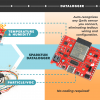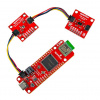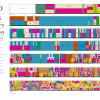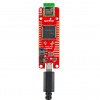Sorry, I think I woke up on a soap box this morning. When I got a link to an article about counterfeit ICs, I read it, but I couldn't help but laugh.

Let's show some scary photos of a electronic waste reclamation project next to a jet fighter and use the names of suspicious sounding people.
"Hakimuddin says she knows little about the parts she has bought and sold."
You've obviously never met a sales person. Ever. I regularly talk to sales reps from Arrow, Digikey, Future, Microchip, Atmel - and while I consider them great contacts and some are even friends, even they do not know what the hell they are selling me most of the time.
"The Navy's Ernst became concerned about IT Enterprise in March 2007. His team found a suspicious transistor?a basic type of microchip?supplied by the firm for use in the AV-8B Harrier, a Marine Corps fighter jet. The transistor, which turned up during an inspection of a military depot in Cherry Point, N.C., was supposed to contain lead in its solder joints, but didn't. That defect could cause solders to crack and the flight control system to fail, Ernst explains. When a member of the team telephoned IT Enterprise in Bakersfield, he heard children chattering in the background, Ernst recalls. "It was the 'Aha!' moment for me on counterfeit parts," he says. "
Wait, wait, wait. You mean the military ordered a transistor, probably paid way too much for it, and when it turned out the be lead-free (probably even RoHS compliant)
they freaked out? Hah! That's just funny. Notice how the entire paragraph
doesn't mention the IC being a 'fake chip' but it's in an article about
fake chips? Ugh, my head hurts.
The writer doesn't even describe what a 'fake chip' is. There are important and unique differences between:
- New ICs (like an EEPROM from digikey)
- OEM ICs (like a no-longer manufactured chip that is licensed and brought back - thank goodness for NTE!)
- used ICs, pulled from recycled equipment
- empty ICs (now that would be funny)
- fake chips (chips that are sold under false pretenses - like an IC labeled 'MAX232' but was really a shift register)
- and 'fake chips' that this article refers to (correctly labeled, functioning chips that are the wrong grade - ie, not military grade)
The entire article is written to scare people. Grr. Bad Media! Stop that.






In the 1980s, the government decided that that COTS (consumer off the shelf) would save them a bundle of $$$. What they didn't know is that COTS also stands for China Off The Street!
Let me contribute some actual facts to clear up this post. Our depot has received many falsely labeled components (not just transistors) that do not comply with military standards or contractual requirements for the specifications of our chips. We require leaded components because tin whiskers have caused real, identifiable, costly failures to our avionics. Tin whiskers can penetrate conformal coating and have been directly responsible for mishaps. This article addresses an issue where Navy contracts specify acquisition of non-ROHS parts that meet desired burn in tests, temperature range from -55C to 125C, etc. When those parts are received and labeled as such, but are later found to be otherwise, they are fake. The navy has many intelligent, educated people working this problem and to insinuate we don?t understand ROHS or otherwise "freaked out" is insulting and unwarranted. Grr. Bad Sparkfun! Stop that.
If you think it is silly that the military are complaining about ROHS, lead-free products, perhaps a few minutes Googling "tin whiskers" would prove instructive. Here is a non-popular-press reference for starters... http://nepp.nasa.gov/WHISKER/
Oh, come on, guys! When has the popular ("mid-stream") press, or even the business press EVER published a coherent and technically accurate article about high technology? It has become a juvenile drinking game to rail against the popular press when they do stuff like this, but did we really expect any better of them?
OTOH, counterfeit parts are a widespread problem not just in military circles. Those of us who like building audio power amps, for example, must be careful to avoid counterfeit transistors. Here is one article on the subject: http://sound.westhost.com/counterfeit.htm
Terrible article, but possibly a real problem: http://www.eetimes.com/news/latest/showArticle.jhtml?articleID=201201791
Sometimes I get a kick out of journalists who get all high and mighty about their "profession."
That's a bad article, but the problem is real - and not just for the military. Crap parts are sold as new ones and you never know how much they have been abused, etc.
Another story that's currently a big concern is chips that contain some evil payload in addition to their intended function. These could phone home, cease to work when told to do so, etc. I'm not sure if this would actually be feasible, but DARPA is spending a lot of money to develop the means to detect that kind of thing.
Also: there's also another category of fake chips - when two devices have the same piece of silicon in them, but one has features disabled (didn't work properly / cheaper model). By hacking the insides of the package, sometimes you can change a cheaper device into a more expensive device, but there's no guarantee that they'll work. I recall this being a problem with some older Intel parts - not just selling a 33 MHz chip as a 66 MHz chip, but hacking the FPU to work where it shouldn't.
To continue... the article SHOULD scare you because it is a scary part of our world today. The funny named Hakkmuddin and her lack of technical knowledge is a red herring and not a major point to discuss, but the fact that these reclaimed and conterfeit parts come from China is not funny either. While these guys make a few bucks off the parts they sell, they drive up the cost of our defense and space programs since we have to work harder to weed out the crappy parts and deal with test failures. It's cheaper than hiring spies to sabotage our factories. Whether it's on purpose or not is hard to prove, but the problem is real and it affects the defense of your nation. And off the soap box.
It probably seems funny, but unfortunately you are off the mark with your comments about the article. It is a big deal and it is exactly products like the F15 where this matters most. "Fake" chips have been found in all the categories that you describe. Many points I would make have been made by other posters (tin whiskers, etc). I would add that a mature design for aerospace does easily allow other parts to be substituted so manufacturers end up desperately trying to find older mil-grade (really just highly tested) parts. Due to rigorous design requirements its often more expensive to over pay for an IC than to redesign.
This really does make me want to rethink my career choice though. I could've made a lot of money being a google-jockey and procuring parts for the gov all this time...
Tesla rules
Ha! "On A Quiet Street." I like that. Quiet streets mean something shady is going on...
This kind of fear-based tech reporting goes on so often and has been around for so long that it's hard to even be angry about it sometimes. A couple of years ago I read an article about some engineers that figured out how to 'change the programming on a router to put in backdoors and steal your information.' It seems scary, but really all these guys did was learn how to use a JTAG port. Also, about 115 years ago I read something about some loony Serbian guy developing a new form of power that was deadly and dangerous...
Yea, I hate articles written like this. If a transistor is a basic type of microchip, then a unicycle is a basic type of jet fighter.
If Mariya can broker military chips from her home to the tune of $2.7 million, I wonder how much I could broker in military toilets from my home. Buy at Home Depot, sell to the military for 100x...
(I'm off my soapbox now)
I have heard of little businesses popping up to verify shady parts.
The military may not want RoHS products because of the risks associated with some lead free alloys such as tin whiskers and tin pest. Now I am sure that someone from Indium, Kester or some other manufacturer will be quick to say that their solders have been tested and I am sure they have and would work fine, but the military and defense contractors might be slow to adopt these changes. Why use a new part when another part has worked for decades without issue in other designs?
That it completely. RoHS is horrible when it comes to extreme environments. Which is unfortunate because so many parts are being made to RoSH it is getting difficult and or expensive to get new parts that are not RoHS compliant.
Bunnie posted some nice photos of real fake chips (as opposed to fake fakes, which would be real?) Anyhow:
http://www.bunniestudios.com/blog/?p=208
Wow, I really hate that 500-character limit. Can't you at least increase that to 750 or so? I've run into that a few times now, and I'm usually no more than 100-150 chars over.
Sorry about the staunch limit there, Robert. It's now been doubled to 1,000 characters for all users. The limit also grows as your rank improves, so I can tell you that with your current rank of +2.9, your limit is actually well over 1,000 characters.
(500 limit) You are very correct Robert - I've got a ticket into IT now.
The trojan horse argument is also valid, and plausible, but certainly not on the 'chip' scale that this article sort of alludes to. Routers yes, transistors no.
Oh, and FAEs do rock.
Hilarious! (Yet sad at the same time)
Just further to the Sales Rep comment, the sales reps don't have much, if any technical knowledge - but that's what the FAEs are for. Field Applications Engineers live and breathe the products that the company sells. They're good people to get to know should you get the chance.
(That's for the edification of the readers - I'm sure the SFE guys know and love their FAE contacts by this point :) )
That is so funny I am from bakersfield I have relocated to Hawaii but I find it funny that nobody seems to know what they are talking about. You do but not the seller the writer and even seems like the military has no idea what was going on. And I have never considered a (1) transistor to be a microchip maby a darlington array or something but not a (1) bipolar junction. But maby thats not what they were talking about.